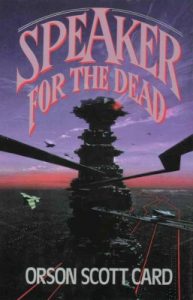Card, O. S. (1986). Speaker for the Dead. Tor Books.


Card, O. S. (1986). Speaker for the Dead. Tor Books.


There is a rich history of science fictional novums crossing into the real world, though we’re still waiting on time travel.
I read this article in the Atlantic (https://www.theatlantic.com/magazine/archive/2020/09/china-ai-surveillance/614197/) as part of a Government seminar paper I’m writing on the fusion of AI and authoritarianism, and I couldn’t help but remark at Orwellian-ness of this vision that Xi’s pursuing. Consider this passage: “[Xi] wants to build an all-seeing digital system of social control, patrolled by precog algorithms that identify potential dissenters in real time.” To Orwell, the idea that smart cameras could constantly monitor even slight displays of dissent was mostly a convenient allegory for Stalinist surveillance regimes. Yet with “hundreds of millions of surveillance cameras in place” already and facial recognition AI that claims to identify emotions, the future seems to be here already. There’s also pervasive surveillance of the internet, financial transactions, and even “Spy Bird” drones that look like doves swooping over cities! China hasn’t fully integrated all of these data streams yet, but there seem to be no major boundaries in their way to doing so, as China’s fusion of a productive tech sector and legal disregard for personal privacy make it a fertile ground for these kind of developments (particularly in Xinjiang as part of the genocide against the Uighur people). Is the the future of autocracy? Can it be countered? Perhaps we should all re-read 1984 or rewatch Black Mirror for some guidance.
P.S. I love the original gifs and artwork by Jonathan Djob Nkondo that accompanies this piece in the Atlantic. I attached one above, but I recommend that everyone checks all of them out!